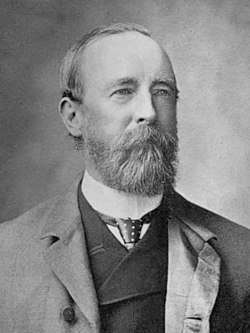Old Man's Hope
Old Man's Hope is a poem by Allan Octavian Hume, the founder of the Indian National Congress, in which he sought to channel the zeitgeist of unrest prevalent in India in the 1880s towards a self-rule movement.[1][2]

Allan Octavian Hume (1829-1912) first published Old Man's Hope in 1886
The poem
The text of the poem is as follows[3][4] -
- Sons of Ind, why sit ye idle,
- Wait ye for some Deva's aid?
- Buckle to, be up and doing!
- Nations by themselves are made!
- Yours the land, lives, all, at stake, tho'
- Not by you the cards are played;
- Are ye dumb? Speak up and claim them!
- By themselves are nations made!
- What avail your wealth, your learning,
- Empty titles, sordid trade?
- True self-rule were worth them all!
- Nations by themselves are made!
- Whispered murmurs darkly creeping,
- Hidden worms beneath the glade,
- Not by such shall wrong be righted!
- Nations by themselves are made!
- Are ye Serfs or are ye Freemen,
- Ye that grovel in the shade?
- In your own hands rest the issues!
- By themselves are nations made!
- Sons of Ind, be up and doing,
- Let your course by none be stayed;
- Lo! the Dawn is in the East;
- By themselves are nations made!
Publication and republication
Hume first published the poem in 1886 in Calcutta.[2] A few years after his death in 1912, the poem was published again on 15 June 1916 in the Home Rule section of Annie Besant's newspaper, New India, which led to renewed popularity for a period.[5]
References
- "Humanity: The Positivist Review", Watts, 1911.
- S.R. Mehrotra, "Towards India's Freedom and Partition", Vikas Publishing House, 1978, ISBN 0-7069-0712-4.
- Mazumdar, Amvika Charan. Indian National Evolution. Madras: G.A.Natesan.
- K. Vyasa Rao, "India's claim for home rule", Ganeshi & Co., 1917.
- Shiri Ram Bakshi, "Home Rule Movement", Capital Publishers, 1984.
This article is issued from Wikipedia. The text is licensed under Creative Commons - Attribution - Sharealike. Additional terms may apply for the media files.